Celebrating Women Community Champions
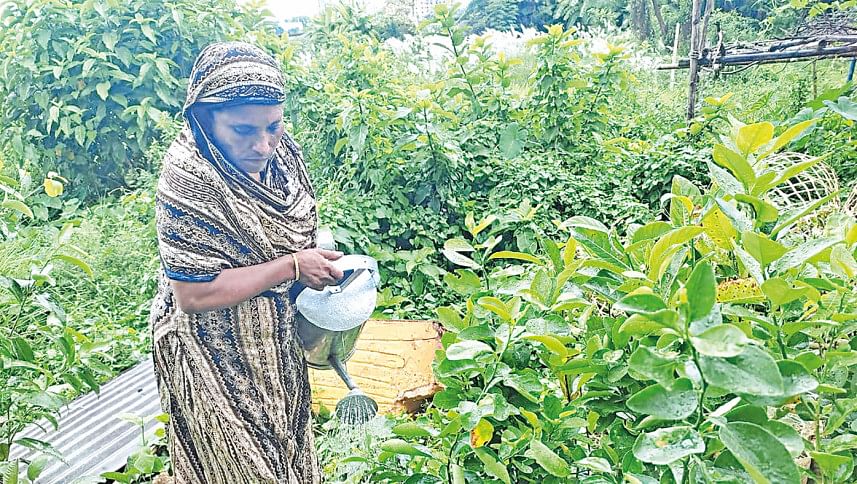
On a mission to bring back greenery
Asma Begum has been working under Dhaka North City Corporation (DNCC) for around 13 years and eventually became the executive member of Dhaka North Community Town Federation, a women-led grassroots organization.
For the last few years, Asma has been on a mission to bring the once-green Dhaka back. Aside from supporting all kinds of community work, the 40-year-old plants trees in the capital's slum areas. Last year, about 1,600 trees were planted, with support from DNCC and other partners.
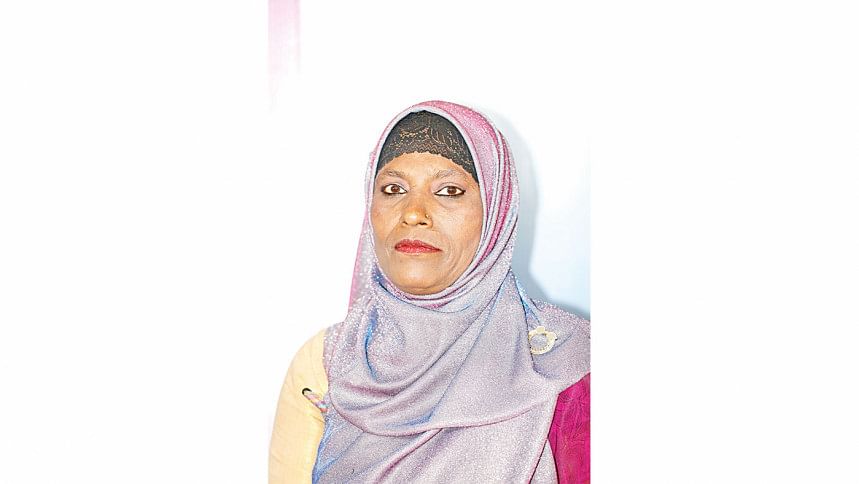
"From getting the saplings to planting them, I'm involved in the whole process. I just love this job, and everyone's happy with my work," she said with enthusiasm. Asma is the talk of the town for supporting the noble initiative of bringing the heat down through trees.
Asma got married when she was just 15 and has five children. Her husband used to work as a chauffeur but has been unemployed since the Covid-19 outbreak. Despite this huge blow, she didn't lose hope. "Before losing his job, my husband fed the family. Now, it's my turn to return the favor," she said. "So, after coming home, I make paper bags till late at night and get around Tk 3,000 by selling them."
Asma has been part of a UNDP project since its beginning, and she is actively involved in all kinds of related work. Under the project, she is a Safe Community Committee member and a change maker for the Bangladesh Legal Aid and Services Trust's committee to combat gender-based violence in the community. Going from one alley to another, she marches to raise awareness about the ills of child marriage and gender-based violence.
"I'm extremely fortunate to have the opportunity to do so much good for my people," she said. "I thank everyone who helped me throughout this journey."
Written by Shoaib Ahmed Sayam
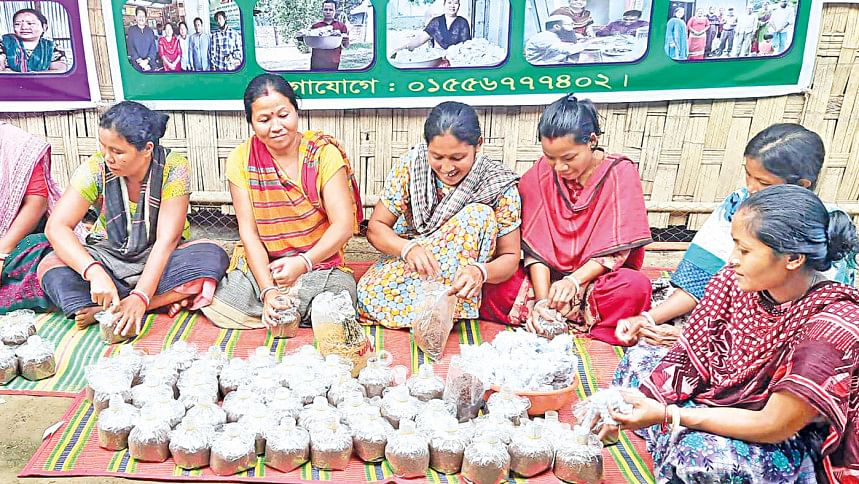
How a mushroom farmer transformed her community
Nipu Tripura's life was enveloped in uncertainty after the arrival of Covid-19. Unable to run her grocery store at the time, her income suddenly vanished.
During this tumultuous period of her life, Nipu came across some YouTube videos of Magura's Babul Akhter, who has been successfully cultivating mushrooms. A resident of the Thakurchara Natun Bazar area in Khagrachhari, Nipu was inspired and decided that she too could start this venture.
Overcoming all obstacles, she has now become an agricultural entrepreneur, cultivating mushrooms on a mass scale. Nipu's endeavor has not only taken her to new heights but has paved the way towards self-sufficiency for many women nearby.
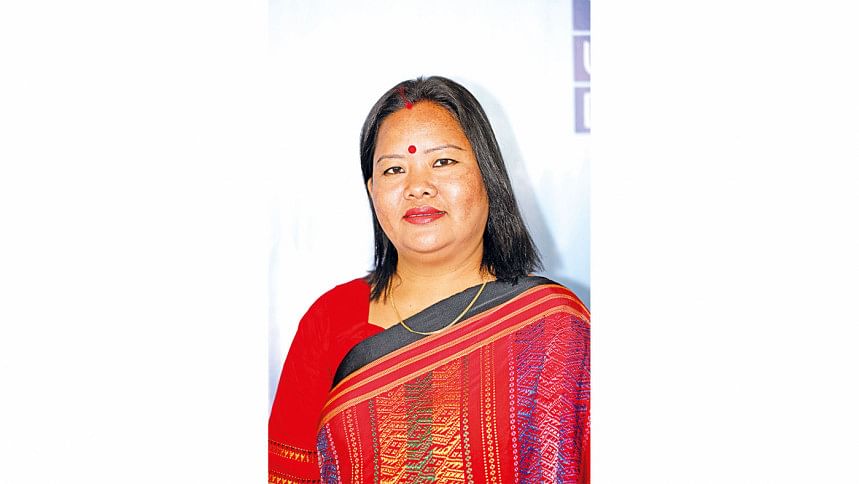
"At first, I had no formal knowledge about farming mushrooms," she said. "But then, I received training in Khagrachhari, Dhaka, and from the man himself, Babul." After learning the tricks of the trade, she started cultivating at Thakurchara in 2020, taking a loan from her husband.
Last year, Nipu received Tk 1, 00,000 from the Women and Girls Empowerment through Education and Skills project under UNDP's SID-CHT project. "I'm now producing around 12,000 spawns every month and 20-15 kg of mushrooms daily," she said. "At first, I only had three employees, then five, and now I have eight women working at the farm." She has also formed a cooperative society with 20 women members and is giving them free training.
Nipu currently dreams of working with mother cultures of mushrooms and expects the government's assistance in this regard. Her mushroom production center is also working towards multiple goals, such as establishing a local outlet for sales, linking up with the national market, and involving new women farmers. "With a bit more financial assistance, I can expand my farm and grow a lot more mushrooms."
Written by Shoaib Ahmed Sayam
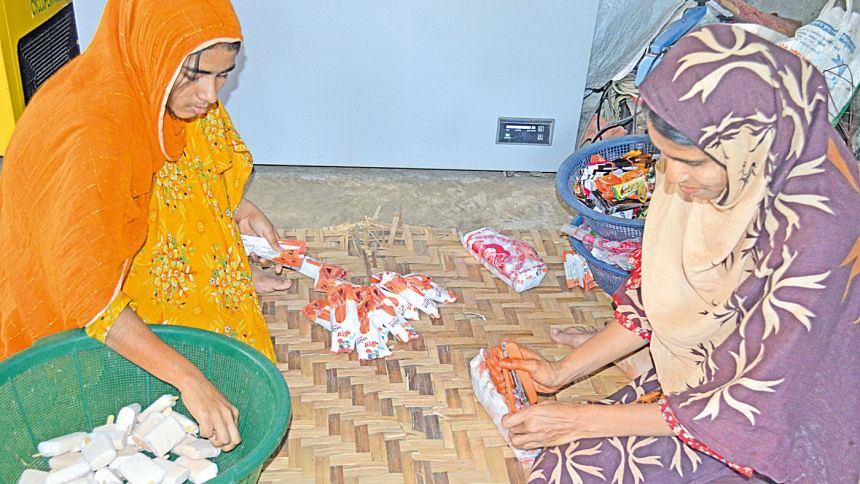
Cooling challenges, scooping success
Sheuli Khatun, 36, oversees operations at a local ice cream factory in Kaliganj, Satkhira, alongside her father, sister, husband, daughter, and son-in-law. Together, they handle everything from crafting flavors to packaging and distribution for local vendors.
Previously, Sheuli faced hardship after her husband left her with two children. Joining the SWAPNO project, a collaboration between the Local Government Division and UNDP Bangladesh in 2018, changed her life by providing income and empowering her to start tailoring. However, realizing the need for additional income, Sheuli and her family pooled their resources to launch the factory last year, quickly gaining popularity.
Today, her ice cream factory generates a daily net income of BDT 3500, complementing her earnings from tailoring. Sheuli now creates employment opportunities for women in her community.
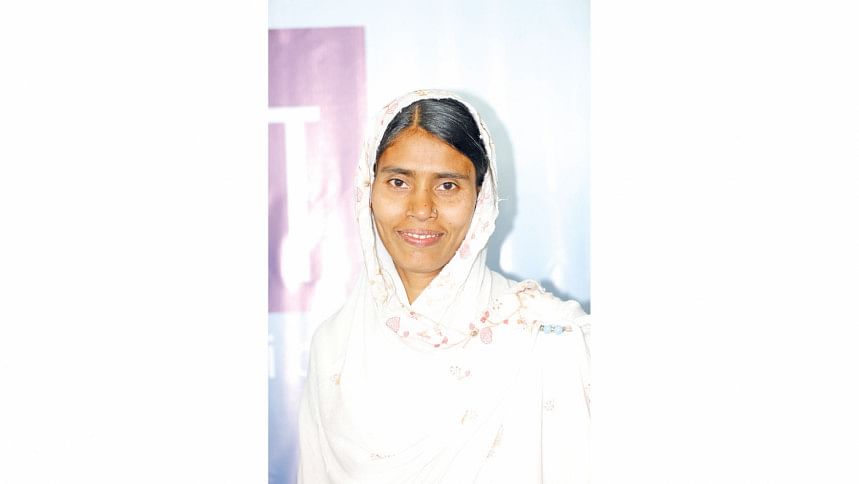
Reflecting on her journey, Sheuli urges others to confront obstacles, embracing struggles as opportunities for growth. "My life has been far from easy, but I'm grateful for every experience," she shares. "I believe in a brighter future and in every woman's ability to overcome challenges with resilience."
Currently, Sheuli's main challenge is securing property to relocate the factory and eliminate the hefty annual rent of BDT 68,000. Despite the hurdles, she remains hopeful, understanding that this endeavor requires time, capital, and ample freezer space.
Sheuli's impact on society is evident through her strength and community-driven efforts. She has carved her path to dignity and economic independence with determination, inspiring those around her.
Written by Tazri Marwa Ahmed
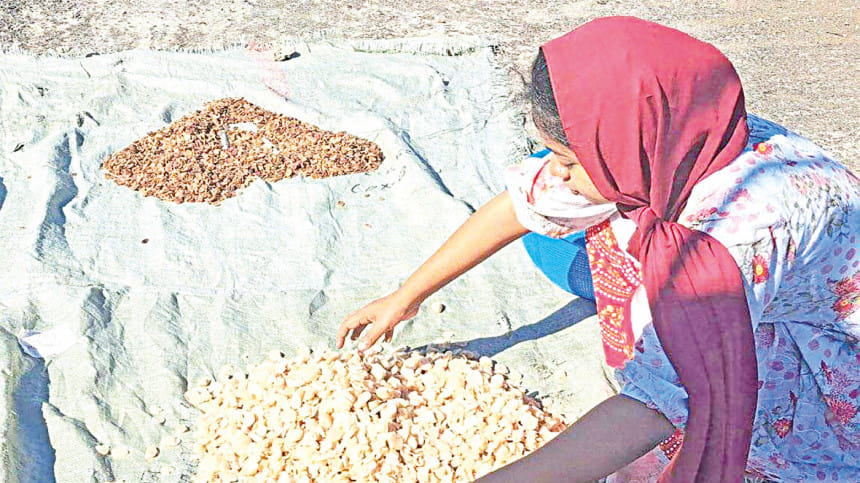
Empowering fisherwomen through sustainable entrepreneurship
23-year-old Nazma Akter Reshmi, a student at Cox's Bazar City College, embarked on her entrepreneurial journey in 2021. She aimed to address the health risks posed by conventional dry fish products containing harmful chemicals like DDT. She innovatively diversified her offerings under the eco-friendly brand "Palongki Konna." Her brand has been dedicated to promoting the sustainable development of women's livelihoods in fishing communities across Cox's Bazar, while also creating opportunities for fisherwomen.
Her commitment to health-conscious products is evident through comprehensive training and active engagement of the fishermen's wives involved in producing a diverse range of high-quality dry fish, fish powders, fish chips, and more. Reflecting on the evolving stages of her business, Reshmi shared, "In the initial phases of my journey, investing in publicity for my products was beyond my means. Consequently, I turned to platforms like Facebook for digital marketing. Utilizing groups such as the Anondomela platform, an e-platform of UNDP, provided me with the means to garner initial visibility." Nazma is currently one of the 3000 members of the Anondomela platform.
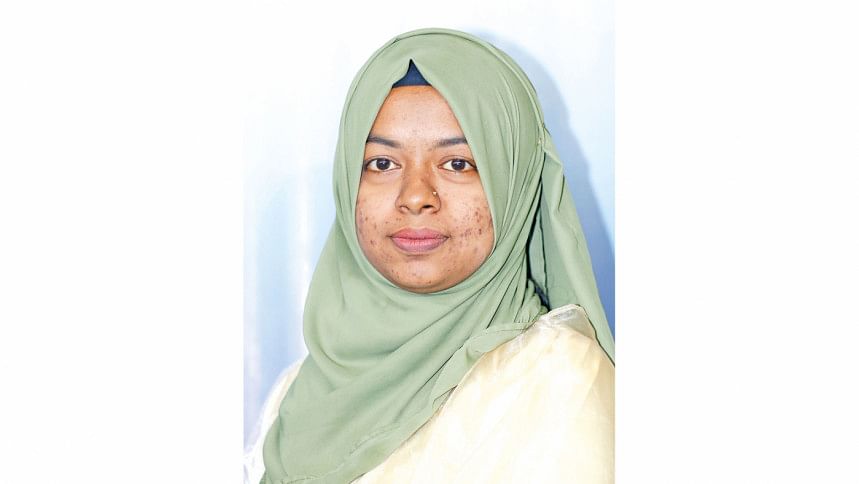
"My family initially had reservations about my pursuing business or employment outside our family, but now they recognize the significance of my involvement in work beyond the confines of home. The turning point occurred during the Covid-19 pandemic when they granted permission for me to run my business from home," she shared. Reshmi aims to scale her production from 50 kg per day to industrial levels. Her dream involves meeting stringent food quality standards, showcasing her commitment to excellence, and continuously improving the financial stability of struggling fisherwomen.
Written by Priyam Paul
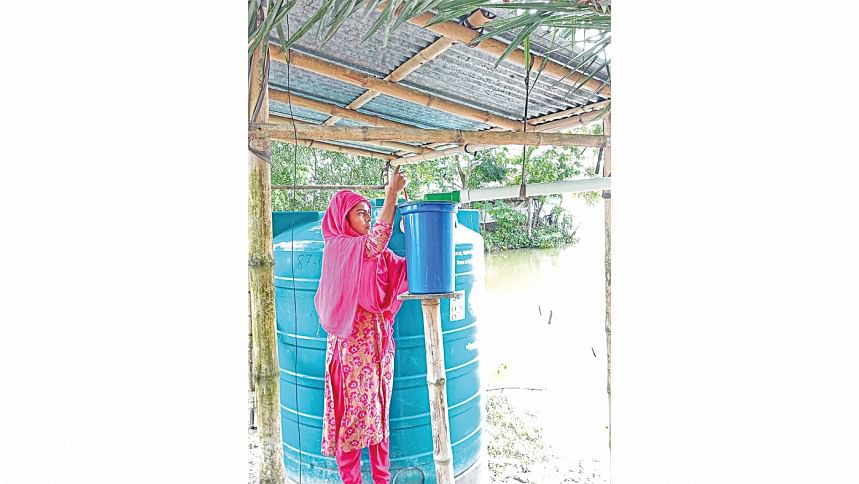
How 'Pani Apa' is fighting salinity woes
After getting married, Poly Khatun started living in the Baradal union of Satkhira's Assasuni Upazila, a coastal area reeling from climate-induced salinity. Brought up in a different Upazila, away from the coastal area, these challenges were alien to Poly.
Soon enough, she realized how the curse of salinity was affecting the lives and livelihoods of her neighbors. She witnessed first-hand how it was harming her husband's fishing business, for which she had to collect drinking water from a place two kilometers away from home.
However, things were about to change.
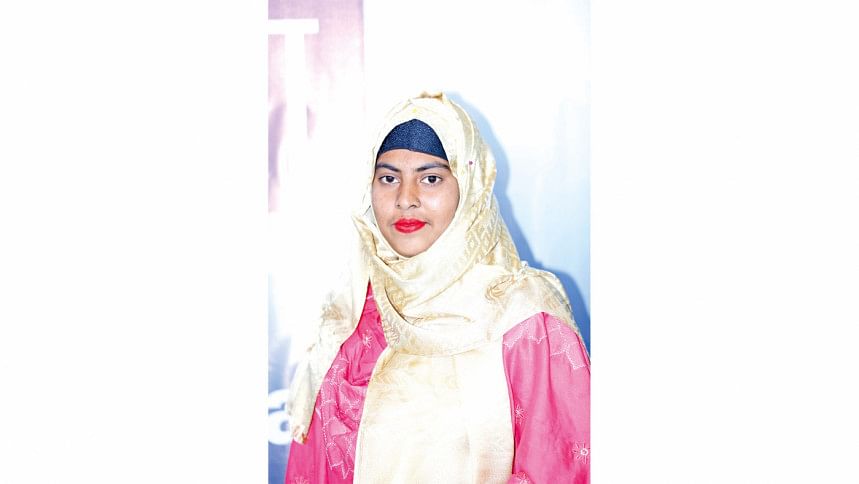
In 2021, Poly was selected as a recipient of the Household-based Rainwater Harvesting System (RWHS), facilitated by the Gender-responsive Coastal Adaptation project under UNDP. And eventually, she became an inspiration for all women and girls around her.
Poly is now known as "Pani Apa." After receiving training, she started supporting communities within her ward to repair and maintain the harvesting systems, while receiving a modest payment. This income was her first step towards economic empowerment.
"Before, I had to ask for money from my husband for basic needs. Now, I can fulfill them with my own income," she said, her eyes sparkling while sharing the story.
Later, Poly became a member of the Women Livelihood Group under the project. Her group is practicing homestead gardening and aqua-geoponic, which keeps them connected to economic activities and enables them to earn a decent income.
"When I go out to work, my husband prepares our five-year-old son for school, cooks, and takes care of his parents. We share our workload," she said.
Last year, she got engaged with UNDP's Adaptive Learning Campaign as a "Youth Mobiliser". Her goal is to mobilize adolescent girls and boys in their journey to become "climate agents."
"Many have learned how to maintain water systems from me," she said. "I never thought this work would open so many doors."
Written by Shoaib Ahmed Sayam
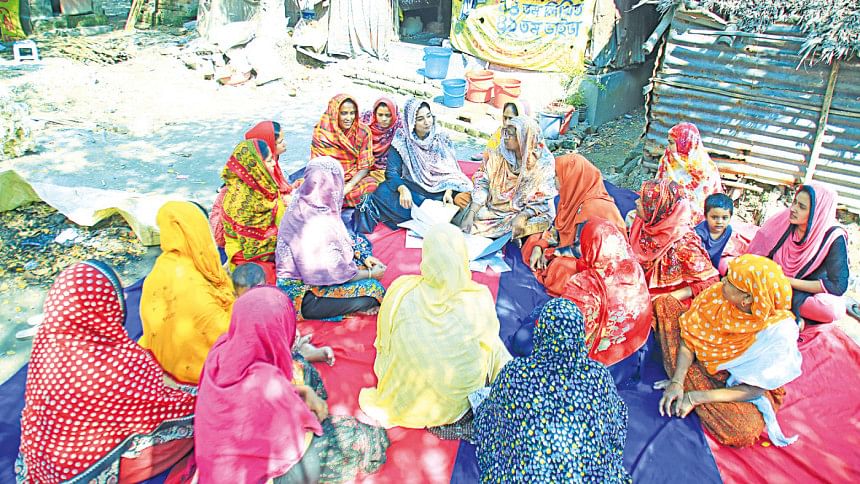
The power of compassion
Suraiya Khan's determined journey against adversity and her unwavering commitment to social welfare have made her a source of inspiration in her community, empowering women to overcome obstacles and embrace empowerment.
Married at 16, Suraiya encountered marital fraud and financial struggles due to her husband's health issues and unemployment, leaving her in a helpless situation. Nevertheless, she remained determined to provide for her family.
In 2010, Suraiya joined the Community Development Committee (CDC) as part of the UNDP's Urban Partnership for Poverty Reduction Program in Khulna. Inspired by its innovative approach, she began with a Tk10 savings initiative. By 2014, she advanced to Vice-Chairperson, leading a savings program for 20 women. Today, as the CDC Cluster's cashier, she represents 13 CDCs, benefiting over 4,500 households. Additionally, the UNDP's LIUPC Project granted Suraiya BDT 7,000, fueling her successful egg business through diligence and business acumen.
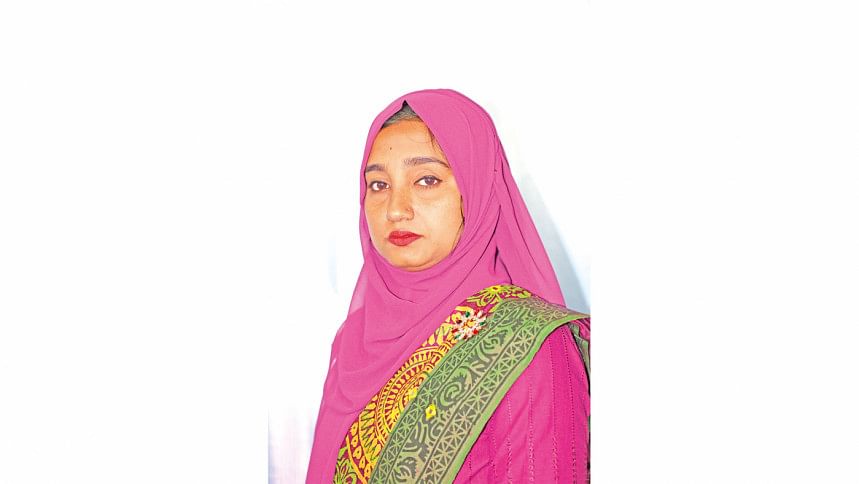
Surviving child marriage and educational disruptions, Suraiya actively fights against these issues. She collaborates with governmental and non-governmental entities such as the Department of Social Service, the Department of Women's Affairs, and UCEP. Through her involvement in the Safe Community Committee, Suraiya addresses various social challenges, including domestic violence, violence against women and girls, adolescent drug use, and eve-teasing. Her efforts have resulted in preventing five child marriages and facilitating schooling for approximately 150 children. Additionally, she has assisted in connecting 15 impoverished households in her ward to government social safety net programs.
Throughout the day, Suraiya fields calls from community members, offering assistance without seeking personal gain. In her own words, "It is a gesture of empathy," emphasizing the community spirit she embodies.
Written by Saudia Afrin

 For all latest news, follow The Daily Star's Google News channel.
For all latest news, follow The Daily Star's Google News channel. 



Comments